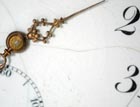Death of timekeeping
Greenwich Mean Time is so last millennium; the ‘correct time’ no longer exists, nor is it relevant. A wild exaggeration or an undeniable truth? Marianka investigates…


Once upon a time, we would arrange to meet people at a certain location at a particular time. We would then endeavour to arrive at said location at that time, lest we should otherwise keep them waiting. Simple enough. So what has changed?
Along came technology. With the advent of the mobile and the Blackberry, we can keep people updated on our movements every step of the way ? ?Just leaving work. There soon?; ?Tube delays. On my way?; ?At Earls Court. STILL waiting for District train?; ?Argh stuck at Putney Bridge. Sandwiched between a German tourist and two bickering small children? etc.
My new mobile phone actually supplies template messages for such occasions, with ?I am late. I will be there at?? and ?I will be arriving at?? among the more usual ?Happy birthday? and ?I am in a meeting? messages. The phone invites you to be late, excuses your behaviour as normal, even expected, and reassures you that there is no need to worry about it when you can so easily inform people of your whereabouts and estimated arrival time.
Nor should you worry if you leave someone waiting for ten minutes. After all, they can send emails, play games, watch films or hack into a global bank?s security system via their mobile while hanging around outside the tube station. Or they can text other friends to inform them that they are waiting for you. Always an enjoyable pursuit.
Sadly, this has led to a massive decrease in respect for timekeeping. Punctuality is an unexpected bonus, and emailed-in delays the norm. I recently arrived at quarter to eight for a social event scheduled to begin at 7:30pm and was greeted in some bewilderment. Not only had I arrived astonishingly early, but I had failed to call, text, email, semaphore or otherwise contact my hostess to warn her of my imminent arrival.
There is an undeclared war on punctuality, with everyone battling not to be the one who arrives first, and is therefore left forlornly waiting, inviting sympathetic looks from passers-by or hovering waitresses. Far better to leave late, linger at the ticket barrier, check your emails and update your Facebook status before venturing out to the meeting point, where you must stand in full public view, marked out as someone who is not important enough to deserve punctuality.
Bucking the fashionably late trend, I am growing ever more like my mother in my timekeeping (worrying), taking to setting my watch seven minutes fast, so as to ensure punctuality, rather than avoid it. Surely better to arrive a little early, thereby escaping the mad dash through the station, fighting through hordes of commuters and tourists, and instead begin the evening cool and collected, rather than red-faced and panting?
Sign up for the Country Life Newsletter
Exquisite houses, the beauty of Nature, and how to get the most from your life, straight to your inbox.
A fast watch gives you the impetus to get going a little earlier than is strictly necessary, but buys you time at the end of the journey, so that the last leg can be strolled nonchalantly, make-up touched up, hair smoothed, and a casually sophisticated demeanour adopted. The seven minutes is key: random enough that you can?t always remember exactly how much extra time you have, and therefore a glance at your watch sends you scuttling out of the office, and most likely a couple of minutes early for your rendezvous.
However, my mother has taken this randomness to an extreme, with every watch and clock (computer, oven, radio, car) set to a different hour. I wouldn?t be surprised if the kitchen in fact keeps to French hours, and her office to Canadian, such is the bewildering variation in timekeeping.
This leads to the surreal state in which time no longer has any meaning. You can travel twenty minutes back in time between one room and another, crave dinner while in the car and then suddenly be ready for breakfast when taking a call on her mobile. The downside of this is that it is quite a mental arithmetic challenge to gauge when, say, The Archers might be coming on the radio (an important consideration).
Perhaps it isn?t important exactly what the time is, but what your attitude towards timekeeping is. We should be wary about being too cavalier, constantly keeping friends waiting for us or becoming the person in a group with a reputation for tardiness, and, neurotic though it may be, we must realise that a twenty-minute journey in London rush hour could just as easily be thirty-five, so it is always worth giving yourself extra time.
My advice? Set your watch fast and, if you do find yourself waiting, make sure you have a good book with you. A ten-minute wait with Bill Bryson is no hardship?
Country Life is unlike any other magazine: the only glossy weekly on the newsstand and the only magazine that has been guest-edited by HRH The King not once, but twice. It is a celebration of modern rural life and all its diverse joys and pleasures — that was first published in Queen Victoria's Diamond Jubilee year. Our eclectic mixture of witty and informative content — from the most up-to-date property news and commentary and a coveted glimpse inside some of the UK's best houses and gardens, to gardening, the arts and interior design, written by experts in their field — still cannot be found in print or online, anywhere else.
-
 Six rural properties with space, charm and endless views, as seen in Country Life
Six rural properties with space, charm and endless views, as seen in Country LifeWe take a look at some of the best houses to come to the market via Country Life in the past week.
By Toby Keel
-
 Exploring the countryside is essential for our wellbeing, but Right to Roam is going backwards
Exploring the countryside is essential for our wellbeing, but Right to Roam is going backwardsCampaigners in England often point to Scotland as an example of how brilliantly Right to Roam works, but it's not all it's cracked up to be, says Patrick Galbraith.
By Patrick Galbraith